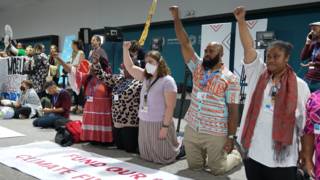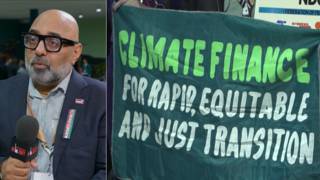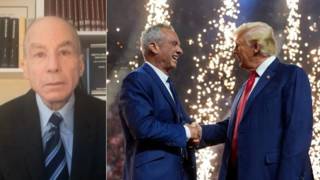
Related
Guests
- Negar Mortazaviaward-winning journalist, host of The Iran Podcast and senior fellow at the Center for International Policy.
As the Biden administration and Tehran carry out a prisoner swap that also includes the unfreezing of $6 billion in Iranian oil revenue, we look at the state of U.S.-Iran relations with journalist Negar Mortazavi, host of The Iran Podcast. The deal represents a major diplomatic breakthrough between the two countries since the end of the Iran nuclear deal, from which the Trump administration unilaterally withdrew in 2018. The prisoner swap came just after the anniversary of the death of Mahsa Amini in police custody last year, which set off nationwide protests against the Iranian government. “What we saw over the past year after the death in custody of Mahsa Amini was nothing short of a mass movement and also, essentially, a cultural revolution,” says Mortazavi, who notes the protests have led to a loosening of social restrictions despite the government crackdown. “I don’t think the government can push it back to where it was before the killing of Mahsa Amini.”
Transcript
AMY GOODMAN: Five Americans released by Iran as part of a prisoner swap have arrived back in the United States. They were released Monday, then flown to Qatar, which helped broker the deal in which the United States agreed to drop charges against five Iranians in the United States. In addition, the Biden administration cleared the way for Iran to access $6 billion of its own money that had been frozen in a bank in South Korea. As part of the deal, the money will only be available to Iran to purchase food, medicine and other nonsanctionable items.
Three of the prisoners released by Iran have been identified publicly: Siamak Namazi, who’s been detained since 2015; Morad Tahbaz, an environmentalist jailed since 2018; and Emad Sharghi, who was also arrested in 2018. The names of the other two have not been publicly released. The five prisoners flew on Monday from Tehran to Qatar. They were joined by two other Americans who had been barred from leaving Iran.
Secretary of State Tony Blinken praised the deal.
SECRETARY OF STATE ANTONY BLINKEN: Just a few minutes ago, I had the great pleasure of speaking to seven Americans who are now free, free from their imprisonment or detention in Iran, out of Iran, out of prison, and now in Doha en route back to the United States to be reunited with their loved ones. Five of the seven, of course, had been unjustly detained, imprisoned in Iran, some for years; two others had been prevented from leaving Iran.
I spoke to them after they landed in Doha. I can tell you that it was, for them, for me, an emotional conversation. It’s easy, in the work that we do every day, sometimes to get lost in the abstractions of foreign policy and relations with other countries, and forgetting the human element that’s at the heart of everything we do. But today, their freedom, the freedom of these Americans for so long unjustly imprisoned and detained in Iran, means some pretty basic things. It means that husbands and wives, fathers and children, grandparents, can hug each other again, can see each other again, can be with each other again. So it’s a day that I’m grateful for.
AMY GOODMAN: Of the five Iranians who had their charges dropped, two have asked to stay in the United States. Another two have returned to Iran, and the fifth is going to an undisclosed country to be with family.
Some Republican politicians in the United States have criticized the deal. Texas [sic] Congressmember Tom Cotton described the deal as, quote, “shameful” and accused the Biden administration of, quote, “paying ransom to the world’s worst state sponsor of terrorism” — that’s Arkansas Senator Tom Cotton.
But family members of the detained Iranian Americans praised the Biden administration’s efforts. In a statement, Emad Sharghi’s sister Neda said, quote, “This is my brother, not an abstract policy. We are talking about human lives. There is nothing partisan about saving the lives of innocent Americans, and today should be a moment of American unity as we welcome them home.”
The prisoner swap also came as the Biden administration announced new sanctions on Iran’s former President Mahmoud Ahmadinejad and Iran’s Ministry of Intelligence for their involvement in what the Biden administration described as, quote, “wrongful detentions.”
The prisoner swap took place two days after the death of 22-year-old Mahsa Amini, who died in police custody September 16th, 2022, just over a year ago, after she was arrested by Iran’s so-called morality police, accused of not wearing her hijab properly. Her death sparked months of protests in Iran and a severe crackdown by Iranian authorities. Rights groups estimate 500 people were killed, more than 18,000 arrested over the past year. Ahead of the anniversary, Iranian police detained Mahsa Amini’s father, warned him against commemorating his daughter’s death.
To talk more about the U.S.-Iran prisoner swap and U.S.-Iran relations, we’re joined by Negar Mortazavi. She’s an Iranian American journalist, host of The Iran Podcast, senior fellow at the Center for International Policy.
Welcome back to Democracy Now!, Negar. Why don’t you start off by talking about the significance of this trade, of the deal that was made? And then we’ll talk about the protests.
NEGAR MORTAZAVI: Good morning, Amy. Let me just make a very quick personal note: This is also very emotional for many of us Iranian Americans. As an Iranian American journalist living in exile who can’t travel back to my homeland specifically because of this issue, this could be me or family members. I actually know one of these prisoners, former prisoners, personally. So this coming back is just a very emotional scene for most Iranian Americans to watch.
As far as the policy, I think this is just an example of successful diplomacy between two adversaries, two rivals. It was a long process, very complex process. Iranian and American diplomats didn’t even meet in person for these negotiations for this complex agreement. There was very heavy mediation involved by trusted partners on both sides, mainly the state of Qatar, where diplomats would literally shuttle between hotels where Iranians and American diplomats were staying, and essentially brought this home and were able to choreograph that whole process of the unfreezing of Iranian assets and also the freeing of the five, each, prisoners on both sides.
JUAN GONZÁLEZ: And, Negar, what do you make of the timing of this release, coming on the eve of the United Nations General Assembly meeting just as President Raisi of Iran comes to New York? What do you make of that?
NEGAR MORTAZAVI: Well, I’m not exactly sure how much of this was timed, although it is a pattern that when domestic issues and problems or, I would say, repression and dissent increases, Iran has been trying to do more outreach and more sort of external gains or diplomatic achievements. And this could be one of those.
But also, let’s remember, this was about a year of intense negotiations, about eight rounds of those indirect negotiations that I talked about. And it was very much reliant on a financial transaction. This big sum of money, $6 billion, that was sitting in South Korea for years, had to be transferred to Europe, be converted, and then go into — be transferred to a bank in Qatar, where the Qatari government will have oversight. So I guess both sides wanted this to be done as soon as possible. And that money was, what we got reporting, was that it was transferred finally last week, and so these were the steps that came right after it. But I wouldn’t be surprised if the Iranians were also trying to time it with the arrival of the president, the Iranian president, into the U.S., in New York for the General Assembly.
JUAN GONZÁLEZ: And, of course, this $6 billion, which some Republicans in the United States are calling a ransom, is actually Iranian money that was frozen by United States sanctions. Could you talk about the sanctions and its impact on the Iranian economy and on the people of Iran?
NEGAR MORTAZAVI: Sure, yes. It’s essentially ransom paid out of their own pockets. Someone was comparing this to a person going to the bank and trying — taking a hostage and asking to withdraw money out of their own account, essentially. So this was money that was frozen by South Korea, oil revenue, at the request of the U.S., or essentially in fear of U.S. sanctions or punishment, and the U.S. basically greenlighted to South Korea or allowed them to unfreeze this money.
But the law, as far as sanctions, hasn’t changed. This is an existing humanitarian exemption that has existed under Republican and Democratic administrations when it comes to sanctions law, that certain purchases, very limited purchases, are allowed even for a country that’s heavily sanctioned. What are those purchases? Food, medicine and limited medical supplies.
So, what’s happened is basically a logistical financial transaction where this money was moved from South Korea, converted from Korean won into euros, and now it will be sitting in banks in Qatar, with direct oversight by the Qatari government, who will be responsible for paying for the transactions. So the Qataris will not be paying the Iranians. They will basically pay the suppliers for these humanitarian transactions, and with some oversight also from the U.S., as Qatar is a trusted partner by both sides.
So I think this argument is essentially against any humanitarian exemptions to sanctions, which existed as far as — as long as sanctions existed. And it gets to the core of, essentially, that exemption, which is allowing food, medicine and medical supplies, no matter what, under any sanction conditions.
AMY GOODMAN: Negar, can you tell us who the five Iranian Americans are, or why don’t we know two of those people, where we do not see their pictures, and also who the Iranians are, who — two are asking to stay here, two went to Iran, and another to a third country? What were they charged with? They weren’t all jailed here, were they?
NEGAR MORTAZAVI: No. So, I’ll tell you briefly. On the Iranian side, two have asked, and their families had asked, to remain anonymous. It’s just a personal decision of the families. It’s sort of that balance: Do you go all out with the media attention to bring more pressure and increase the chance of your loved one being released, or do you keep quiet and try to resolve this with quiet diplomacy? You know, there are two theories, two ways of doing this. And these two families decided to keep it quiet, and they assumed it would increase the chances of them being released. And I think they still try to remain private and not have the names out. So it was as a personal decision of the detainees and their families.
The other three — Siamak Namazi, Emad Sharghi and Morad Tahbaz — Iranian American Morad Tahbaz is actually British, as well as American, so triple nationality. Siamak Namazi, an Iranian American businessman, had been held the longest, since 2016, in Iran. He, essentially, as he says, has been left behind or forgotten by multiple administrations over the years of his detention. Emad Sharghi, also a businessman from this area, the D.C. area. And Morad Tahbaz is an environmentalist, Iranian American environmentalist, from the Connecticut area.
On the U.S. side, the U.S. detention, or the Iranian nationals on the U.S. side, it was all related to sanctions violations, so very specific category, not violent crime, not anything domestic, but essentially federally enforced sanctions and exports violations that these Iranian nationals were charged with, that essentially the government dropped the charges. But some of them were already residents of the United States. One was a resident of Canada. So, essentially, I think they’re going back — again, it’s a personal decision — they’re going back to where their lives and families were, or that decision is just a personal decision. And one or two have decided to go back to Iran. So, it’s been very specific categories. And this was also similar to what happened under the prisoner swap during the Obama administration, as far as —
AMY GOODMAN: Negar, I know you have to go, but I wanted to ask you about this anniversary of the killing of Mahsa Amini and her father being arrested, the state of the protest movement in Iran right now as the president of Iran addresses the U.N. General Assembly.
NEGAR MORTAZAVI: Sure, I have a little bit of time. The anniversary was essentially prepared with a very heavy security presence, pressure on families, pressure on activists, universities — anyone who could potentially show any leadership in bringing about a mass movement. Again, a state, the government essentially tried to prevent that with lots of preemptive pressure.
But the dissent continues. The grievances are still there; they haven’t been addressed — economic, political and cultural. And I think what we saw over the past year after the death in custody of Mahsa Amini was nothing short of a mass movement and also, essentially, a cultural revolution. Women and girls said, “Enough is enough. You can’t kill a woman for how she’s dressed,” which is one reading of the religious attire. And they started defying the mandatory hijab in ways that we haven’t seen before, the courage, the bravery, putting their lives and their bodies on the line and saying, “I want autonomy, bodily autonomy, and I’m going to start dressing the way I want” — young girls, schoolgirls. So, the bravery and the courage has been amazing to watch. And it’s been constant, ongoing over the past year and still continues. But as far as mass protests like the way we saw last year, the government and security forces have tried very hard to prevent that.
JUAN GONZÁLEZ: And have there been any concessions by the government in the past year in terms of the rights of women in Iran?
NEGAR MORTAZAVI: I don’t think we can call them concessions, but women have been able to push the government back, essentially, by force, by saying, “I refuse. I am risking my life. I’m risking arrest. I’m risking my career, my job.” Women have been fired. Businesses have been closed. They get fined. They get tickets if they drive without the headscarf. But nevertheless they continued.
I think the leap or this giant push that they made over the past year would eventually happen maybe in the next decade or two, but it just accelerated it; the killing or death in custody of Mahsa accelerated it, with women essentially channeling this anger into more resistance and more fight. And women in Iran on the ground tell me that there’s sort of an unspoken sisterhood, a solidarity, that when they see each other defying the law and not wearing the hijab, they get even more courage, more bravery, and feel like they’re not alone. And now there’s just so many of them. The Iranian public, the way it looks has been very, very different. It’s dramatically changed since it was last year. And I don’t think the government can push it back to where it was before the killing of Mahsa Amini.
AMY GOODMAN: Negar Mortazavi, we want to thank you so much for being with us, Iranian American journalist, host of The Iran Podcast, senior fellow at the Center for International Policy, speaking to us from D.C.
Next up, we go to Ryan Grim on how the U.S. helped Pakistan get an IMF bailout with a secret arms deal for Ukraine. And we’ll talk about, here in Washington, D.C., the shutdown showdown, as House Speaker Kevin McCarthy faces off against his own right-wing Republican lawmakers. Stay with us.
[break]
AMY GOODMAN: “Baraye,” means “because of,” by the Iranian singer Shervin Hajipour. It became the unofficial anthem of the Iran protests last year. The song’s lyrics were compiled from messages Iranians posted online about why they were protesting.












Media Options